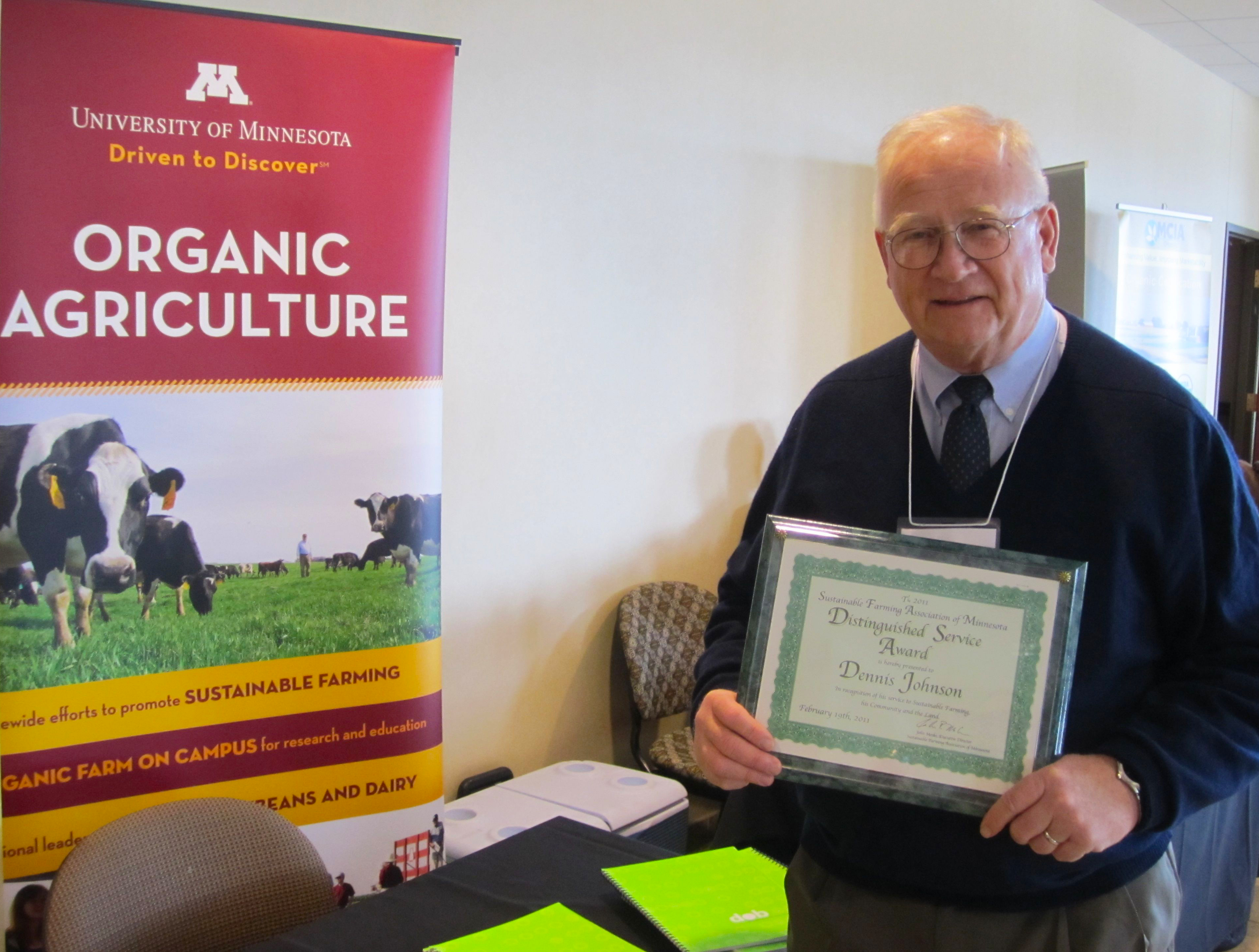Thoughts of revolution were in the air at the Sustainable Farming Association of Minnesota’s twentieth annual conference, The Routes of Sustainability: Food, Farming & Fellowship, held February 18 - 19 at the College of St. Benedict. SFA MN is a farmer-led organization that works to connect farmers with eaters across the state.
The crowds gathering in Madison to protest Wisconsin Governor Scott Walker’s proposal to limit the collective bargaining rights of many public employees, and the hundreds of thousands across the Middle East demanding change in their leadership and way of life, provided a feeling of empowerment as Minnesota farmers, foodies, and sustainable agriculture advocates spent two days talking about new forms of income and investing, a new brand identity for SFA, new software tools, “new” varieties of heirloom seeds, and everything in between.
The weekend’s keynote address was delivered by Woody Tasch, founder of Slow Money. Tasch admitted his talk was less structured than it might have been; inspired by the previous week’s events in Egypt, he had taken the revolutionary theme to heart and begun re-designing his PowerPoint presentation only the night before. Tasch jumped from topic to topic, tracing revolutions throughout human history, referencing quotes from Martin Luther King, Jr. and Robert F. Kennedy, and discussing the current state of philanthropy in the U.S. (welcome information to the non-economists in the room). All of this was interspersed with the history, principles, and mission of Tasch’s Slow Money organization. Despite his lecture's lack of structure, Tasch’s points came through loud and clear, leaving the crowd inspired and -- as the big turnout at the Slow Money Q&A session later in the day proved -- excited to keep the conversation going.
 Dennis Johnson, winner of SFA's Distinguished Service AwardThe goal of Slow Money is to see “a million Americans investing 1% of their assets in local food systems within a decade.” Tasch encouraged conference attendees to take a hard look at the consequences the current US economic system is having on the planet. It is no accident, he suggests, that we have both a broken financial system and a broken food system, as “money flows out of the soil and into industry.” Currently, only a fraction of a percent of all philanthropic investments are put towards sustainable agriculture. Reversing this trend by investing in local food systems can fundamentally change the way we approach money and the economy, while “reconnecting us with the earth and other life via the flow of capital.”
Dennis Johnson, winner of SFA's Distinguished Service AwardThe goal of Slow Money is to see “a million Americans investing 1% of their assets in local food systems within a decade.” Tasch encouraged conference attendees to take a hard look at the consequences the current US economic system is having on the planet. It is no accident, he suggests, that we have both a broken financial system and a broken food system, as “money flows out of the soil and into industry.” Currently, only a fraction of a percent of all philanthropic investments are put towards sustainable agriculture. Reversing this trend by investing in local food systems can fundamentally change the way we approach money and the economy, while “reconnecting us with the earth and other life via the flow of capital.”
Tasch's philosophy sounded great. Who could argue with diverting money away from big, nameless industry toward local farmers and small food enterprises, encouraging investors to reconnect with their neighbors, their soil, their food, and their health? Still, I was feeling unsure of the action steps that would link his ideas with reality. Luckily, Tasch's breakout session later in the day focused mainly on what his organization is actually doing now, and planning for the future.
The first thing Tasch clarified was that Slow Money “is not one thing” -- rather, it’s a network of people, engaging in various activities around the country, who are all committed to the Slow Money Principles. Tasch also explained that the Slow Money concept took off faster than he and his colleagues expected. Once they started talking about their ideas, “the energy came,” he explained, “and now we need to figure out how to harness it.” So far, Slow Money has organized a network of like-minded thinkers from around the country and formed localized Small Money groups, held two national gatherings to facilitate investment activities, and built a non-profit fund to contribute philanthropic investments. They are currently working on building investment products and bringing members into the Slow Money Alliance to get money flowing.
The on-the-ground, here-and-now focus of the rest of the conference provided a nice contrast to Tasch’s big, broad ideas. Conference attendees had the chance to sit in on over fifteen smaller breakout sessions, see artisan food demonstrations, pick up literature from the various exhibitors, and chat over coffee or the generous (but not necessarily local and sustainable...) lunch buffet provided by the college’s food service. And, throughout the day, quiet hints of a changing system were apparent.
SFA members and local farmers have been supporting each other for years -- the growing strength of this support network was obvious from a look at the inter-generational crowd, as long-time members and farmers mingled with young conference attendees looking for farm internships. Anne Borgendale, SFA’s communications coordinator, commented on one way she gauges a conference’s success: “One of the indicators I use… [is] the number of conversations I saw, especially conversations between unexpected people such as older, established farmers and beginning farmers or college students. It seems like I see more of these every year.” Another measure of success is the numbers: the SFA MN conference has tripled in size in the past few years.
 A Minneapolitan myself, I was surprised to recognize lots of co-urbanites, many of whom had come to the conference to network and explore the latest happenings in the world of Minnesota sustainable agriculture. Farmers and entrepreneurs interested in developing their own agritourism businesses learned how to pursue this growing trend in a course presented by Renewing the Countryside, paving the way to profitability. SFA even joined the “revolution” by showcasing their new brand identity. The circular green, blue, and brown logo, featuring two leaves bridged by cycling arrows, suggest growth, connectedness, life, land, and -- most importantly -- the ability of SFA and sustainable agriculture supporters throughout Minnesota to continue to push forward and make change.
A Minneapolitan myself, I was surprised to recognize lots of co-urbanites, many of whom had come to the conference to network and explore the latest happenings in the world of Minnesota sustainable agriculture. Farmers and entrepreneurs interested in developing their own agritourism businesses learned how to pursue this growing trend in a course presented by Renewing the Countryside, paving the way to profitability. SFA even joined the “revolution” by showcasing their new brand identity. The circular green, blue, and brown logo, featuring two leaves bridged by cycling arrows, suggest growth, connectedness, life, land, and -- most importantly -- the ability of SFA and sustainable agriculture supporters throughout Minnesota to continue to push forward and make change.
Photos by Katharine Plowman.
 Georgia Rubenstein works at an environmental non-profit in Minneapolis, and loves food in all of its forms -- growing it, cooking it, eating it, feeding it to her worms, and then starting the cycle all over. She can be found philosophizing about food, considering food policy issues, and working to harness the incredible power of food to save the world. She does all sorts of great things with SGT.
Georgia Rubenstein works at an environmental non-profit in Minneapolis, and loves food in all of its forms -- growing it, cooking it, eating it, feeding it to her worms, and then starting the cycle all over. She can be found philosophizing about food, considering food policy issues, and working to harness the incredible power of food to save the world. She does all sorts of great things with SGT.




